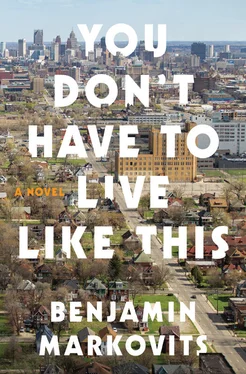“They can hear you,” I said.
“Fuck you, Marny,” she said and walked out.
So I got some pots and wooden spoons from the kitchen and sat down on the floor, banging them together. The older one was reading books. After a while, they both got bored and tried to go into the garden, but I reached the door in time and shut it. The small one started to cry again and Clay Greene came in with Peggy James, Robert’s wife. She had a baby wrapped around her middle in a kind of cloth.
Clay said, “Quiet, son, you’ll wake the baby.”
“He won’t,” Peggy said, “and anyway, it doesn’t matter.” She was pretty, too, less handsome than Clay’s wife but more attractive and noticeably younger than us. She had a button nose and very expressive mouth — big clean healthy gums that kept her mouth open and smiling. Also, she was skinny as a boy, even after childbirth, and wore shorts, because of the hot weather, and her legs were tanned and smooth and strong and thin. She wore pull-up stripy sports socks and sneakers. She was like a sexy kid sister. Everything was okay with her, and when Helen Greene came back Peggy woke up her baby to give Helen a cuddle.
“You look fantastic,” Helen said. “God, how do you do it. I bet you even get some sleep.” And I went outside to find another drink.
The band was a sort of Supremes look-alike act, but shorter, older and fatter, and with bigger hair. They played an afternoon set and an evening set. Around seven o’clock the first bus arrived, to take the guests with kids back to Detroit. Then the lights came on, in strings, hung across branches and bushes and the undercarriage rope work of the marquee. Another round of champagne made its way among us, in bright groups, on the waiters’ trays. Astrid and I went walking into the trees, glasses in hand.
“I’ve had a very bad time,” she said. “It’s only beginning to get better.”
“What happened?”
“I don’t want to talk. I talk about it too much.”
We started making out a little. There was another wooden jetty farther along the shore, mostly hidden by reeds, which kids probably used for diving off. We sat on the wet wooden boards at the end, letting our legs hang and kissing, which isn’t easy. I had a crick in my neck. Eventually she said, “I should tell you, I’m in a project at the moment where I’m filming everything, about me and my life here. So even if we end up going to bed together I want to film it. I don’t know if you are comfortable with that.”
“But you’re not filming this now.”
“I’m not stupid. Everything isn’t possible.”
“Where are you staying tonight?”
“I don’t need to stay with you, if that’s what you mean.” Then: “Do you want to go swimming?”
“It’s too cold for me.”
A few minutes later we stood up (the seat of my pants had gotten wet) and walked back to the party. I kept looking out for Gloria but couldn’t find her. I had never kissed a black girl and wondered if they tasted different. But maybe she had caught the seven o’clock bus. I had another drink. There were things to eat, too, but I wasn’t hungry and had a kind of surging important feeling that it was possible to be more simple and honest with people than I usually was. I could say to Gloria, I want to kiss you and I could also admit that I had never kissed a black girl. Astrid was very honest, and even though she was also pretentious and I didn’t like her much, I admired her for it. She was very pretty anyway. I hadn’t had sex since coming back to America, over a year ago. The way all this frustration built up inside me is to make me think, nobody is very kind to me, and nobody knows me well, either. But I couldn’t find Gloria, she had probably caught that bus. Beatrice walked past me, almost pushed past me, with a red face. I said, “Hey!”
“I need the bathroom,” she said.
“I want to talk to you.”
“You can watch me pee.”
So I followed her inside (she was using the house toilet, not one of the porta-potties lined up by the air-conditioning units) and stood by the door. I could hear the loud stream against the porcelain and water, then it stopped and I could hear the contact of the toilet paper. She came out with wet hands.
“What do you want to talk about?”
“I’m worried about you.”
“I’m worried about me, too. I’m worried about you.”
I tried to kiss her and she pushed me off. We stood looking at each other, combatively. Good-naturedly, too. It was kind of fun, like playing squash and wanting to win. I tried to kiss her again and this time she let me and we kissed for maybe a minute before she pulled away.
“Marny,” she said, “please, don’t force it,” and walked out into the garden again. Eventually I followed her, feeling pretty tremendously sad and drunk.
There were maybe fifty people still standing around, under the lights, though the second bus idled in the narrow roadway at the front of the house. I could hear it, and see it through the trees: “RedLine Motor Company, You’re Halfway There.” But the band sang “I’m Gonna Make You Love Me,” and the microphone magnification made it sound like it was coming from somewhere else. Maybe the shore. The wind had died down; the night was clear, not very hot. The stars looked about as far away as the lights of a house across a lake.
I hadn’t talked to Robert James all night, but I’d seen him. His wristwatch strap had broken, so whenever he wanted to check the time he had to take the watch out of his pocket and hold it softly in his hands. For some reason this was very endearing. But I caught him now alone, looking at a broken champagne flute in the grass.
“You wondering if you should pick it up?” I said.
“I don’t want anyone to step on it. One of the kids, tomorrow morning.”
“It’s starting to get messy, isn’t it?”
“What?” he said, and I waved behind us at the party. There were people dancing on the plastic parquet laid down under the marquee, but not many. Maybe five or six couples. There were also a few tables scattered underneath and people sitting around those. A queue outside one of the porta-potties — the other one had overflowed.
“You want to walk down to the water with me?” Robert said. “How are you doing anyway?” We reached the foot of the pier and stepped out onto it, and then Robert climbed down suddenly into the speedboat. “Don’t worry,” he said. “I’m not going to turn it on. I just want to feel the water.”
“I’m thirty-four years old. I have no job or wife or kids or girlfriend. For some reason I’ve moved here, on your dime.”
“Don’t worry about that. I got a lot of dimes.”
“I don’t know, Robert. I’m having anxiety-sadness.”
“What’s that?”
“There’s a hundred things I’m worried about, but what really worries me is that even if they all turned out okay I wouldn’t be any happier.”
“I’m a little caught up in temporary concerns myself,” Robert said.
“What kind of concerns?”
He didn’t answer for a while. Even in the half-light coming from the garden and reflected in different ways off the water I could see he was a very good-looking guy. Without making any particular effort. He wore chinos and a shirt and no tie. But he looked comfortable in boats and like the kind of guy a woman could trust to pay for their kids’ private schooling. “You know,” he said eventually, “my father, before he died, started exposing himself. Mostly to his nurses, young women.”
“I didn’t know he was dead. I’m sorry.”
“Partly it was just one of these mental degenerative things. Alzheimer’s, whatever you want to call it. And nobody got hurt. He wasn’t threatening or anything. But it was like, all his life what he really wanted to do was take down his pants. And just show people, I don’t know. You never met him or maybe this would mean something to you. But when I was a kid, Jesus, this guy had all the answers.”
Читать дальше












